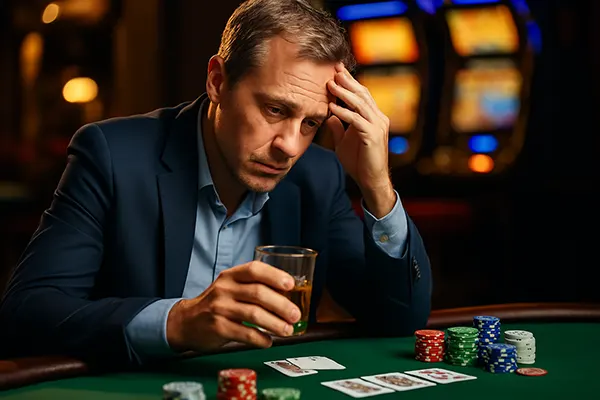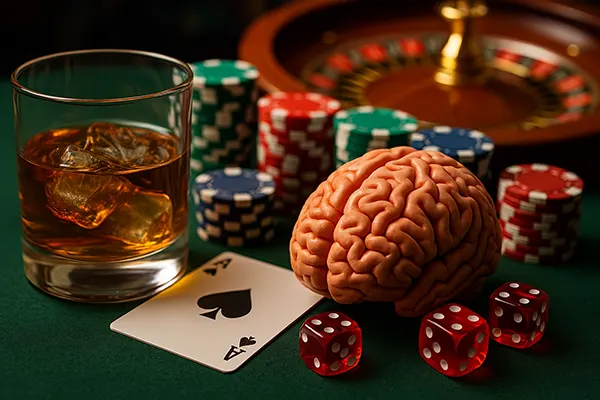
How Alcohol Affects Decision-Making in Gambling: Science vs. Myths
Alcohol consumption and gambling have long been linked in both cultural narratives and scientific inquiry. Many gamblers enjoy a drink or two while playing, but how does alcohol truly influence decision-making in gambling environments? This article explores the scientific findings on this issue, debunks common myths, and offers insights relevant for players who want to understand the risks more clearly.
The Science Behind Alcohol’s Cognitive Effects
Alcohol is a known central nervous system depressant that affects the brain’s executive functions — those responsible for decision-making, self-control, and risk evaluation. Numerous studies, including research published in the “Journal of Gambling Studies” and findings by the National Institute on Alcohol Abuse and Alcoholism (NIAAA), have shown that even moderate alcohol consumption can impair judgement, increase impulsivity, and lead to riskier gambling behaviour.
When alcohol is consumed, the prefrontal cortex — the part of the brain responsible for rational thinking — is one of the first areas affected. This can make players more susceptible to cognitive biases, such as the “gambler’s fallacy” or illusions of control. These distortions often result in poor strategic choices, overestimation of skill, or continued betting despite losses.
Scientific data also supports that alcohol weakens the brain’s ability to learn from past mistakes. This is particularly dangerous in games of chance, where recognising patterns of loss or shifting odds is essential for responsible gambling.
Neurological Pathways and Risk Perception
Neuroimaging studies have shown that alcohol affects the brain’s dopamine system, which regulates reward and pleasure. Under the influence of alcohol, this system becomes more active, creating an inflated sense of euphoria and reward anticipation. As a result, gamblers may feel overconfident, misinterpret odds, and chase losses more aggressively.
This altered perception of risk and reward can cause a disconnect between actual outcomes and perceived success, making it more difficult to assess whether one is truly winning or losing. The blurred line between confidence and recklessness increases the chances of developing problematic gambling behaviours.
Importantly, these neurological effects are not limited to heavy drinking. Light to moderate alcohol consumption has been found to produce similar results, especially in high-stimulation environments like casinos, where sensory cues can amplify decision-making errors.
Debunking Common Myths About Drinking and Gambling
One of the most persistent myths is that alcohol helps players “relax” and therefore improves their performance. While it’s true that alcohol may temporarily reduce anxiety or social inhibition, it does not enhance strategic thinking or improve odds in any way. Relaxation can lead to overconfidence, not better results.
Another popular belief is that seasoned gamblers can “handle their drinks” without consequence. However, scientific research does not support this. Cognitive impairment due to alcohol affects all individuals, regardless of gambling experience or tolerance levels. Even players who appear unaffected may be subconsciously making poorer decisions.
Some players also think that drinking adds fun or glamour to the gambling experience. While there’s a cultural element to this notion, especially in land-based casinos, this attitude often overshadows the real risks. Alcohol can transform entertainment into compulsive behaviour when decision-making faculties are compromised.
How Myths Influence Player Behaviour
Believing in these myths can lead to normalising harmful behaviours. For example, players might view excessive drinking as a standard part of casino nights or poker sessions, even if their performance declines. This contributes to a culture where risk-taking is not only expected but encouraged.
Such beliefs are also reinforced by popular media and advertising, where the “cool gambler” image often includes a drink in hand. This portrayal glamorises a behaviour pattern that may lead to financial loss, emotional distress, or addiction when unchecked.
By recognising the myths and understanding the science, players can make more informed choices. Awareness campaigns in both online and land-based casinos are increasingly addressing these misconceptions to promote responsible play.

Responsible Gambling and Alcohol Use
Responsible gambling involves maintaining control over one’s actions, emotions, and finances. Introducing alcohol into the mix makes this significantly harder, as intoxication compromises self-awareness. For this reason, many gambling support organisations advise limiting or completely avoiding alcohol while playing.
Casinos, especially online platforms, are becoming more proactive in promoting responsible behaviour. Some now offer features like reality checks, loss limits, and “cooling off” periods to help users manage their habits. Educational messaging about the risks of alcohol use is often part of these tools.
Players who gamble after drinking should be especially cautious. It’s helpful to set betting limits beforehand, avoid high-stakes games, and monitor time spent playing. The goal should always be entertainment, not chasing winnings — a line that alcohol can blur.
Steps for Staying in Control
Set a firm bankroll limit before you begin gambling and stick to it, no matter what. Avoid making financial decisions — like increasing your budget or taking out loans — while under the influence of alcohol.
Take regular breaks to reassess your mental clarity. If you feel your judgement is slipping or you’re making impulsive bets, it’s best to stop playing entirely until sober. Self-awareness is key to avoiding long-term consequences.
Consider playing in environments that don’t encourage drinking, such as online casinos that don’t promote alcohol or private settings without social pressure. This allows for clearer judgement and a more conscious gaming experience.
